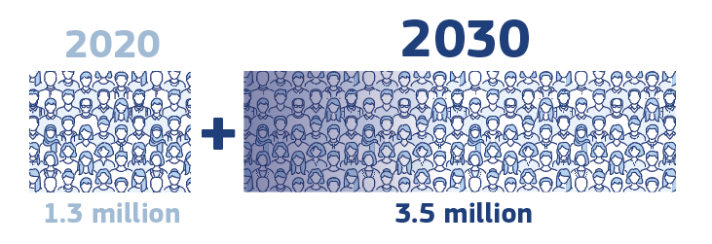
Successful policymaking depends on the support and involvement of the people at its centre. Youth are a special case in point: they are directly concerned by many decisions taken at different government levels and are at an age decisively shaping their attitude to citizenry.
Given that 67% of young people see how actions taken by the EU have an impact on their daily life, the European Commission wants to create the conditions to allow young people to fully participate in policy discussions and drive change.
President von der Leyen has made enhanced exchanges and dialogues with citizens, and particularly with youth, her priority. She has also asked all the Commissioners to organise annual Youth Policy Dialogues, to be launched within their first 100 days in office. Dan Jørgensen, the Commissioner for Energy and Housing, will hold his first Youth Dialogue in Brussels on 18 February 2025.
Employment and skills in the energy sector
While most jobs in the EU energy sector are still linked to conventional sources, there are some important changes in the trends already. In 2020, the renewables sector employed over 1.3 million people. As EU policies drive the uptake of clean energy technologies and renewables deployment, many new opportunities in the labour market will arise. It is estimated that as many as 3.5 million new posts will be needed by 2030 to cover the increase in demand.
Zooming in on specific sectors, the wind industry alone is estimated to grow from 300 000 jobs in 2022 to over 900 000 by 2030. The photovoltaic sector grew from 466 000 workers in 2021 to 648 100 by the end of 2022 and is estimated to reach over 1 million workers in 2025. There has also been significant growth in recent years in the heat pump and solid biofuels sectors.
It is thus imperative to ensure that young people have the necessary education and skills to enter this market.
A lack of information amongst youth can constitute a barrier that prevents them from becoming involved and taking interest in the energy sector and what it can offer. The Commission is therefore increasing its efforts to provide information, offer more tools and opportunities for young people to participate in the energy transition, and make their voices heard, including in the policy process.
Existing analyses point to further obstacles, such as not factoring youth needs to a sufficient extent in policy debates, or lack of detailed curricula in secondary and tertiary education allowing for the development of professional skills in the sectors expected to expand.
Young Energy Ambassadors
To encourage youth awareness about energy policy and their engagement in the clean energy transition, the Commission launched in 2023 the Young Energy Ambassadors programme.
It aims to promote direct engagement and representation of young energy professionals in the EU’s largest event dedicated to the clean energy transition, the annual European Sustainable Energy Week (EUSEW).
Through a call for application, 30 young people who work, study, or who are otherwise engaged in the energy sector, are selected to become Ambassadors. Their mandate lasts for 12 months, during which they contribute to the energy policy process and are tasked to communicate and raise awareness about EU energy-related issues amongst their peers.
The call for application for the 2025 selection of Young Energy Ambassadors was launched on 28 January.
Energy policy in the classroom
DG Energy participates in the ‘Back to School’ initiative, which allows Commission staff to visit schools and universities in any EU country and share insights with the students about the EU in general, as well as their area of expertise, and respond to their questions about EU energy policy.
There is also material in the EU Academy website offering e-learning content on energy, climate and environment issues and the Energy explained section of DG Energy’s website presents various energy topics through videos and infographics in a easy to understand way, linking to more in-depth material for those who want.
Related links
Details
- Publication date
- 16 January 2025
- Author
- Directorate-General for Energy

